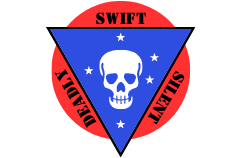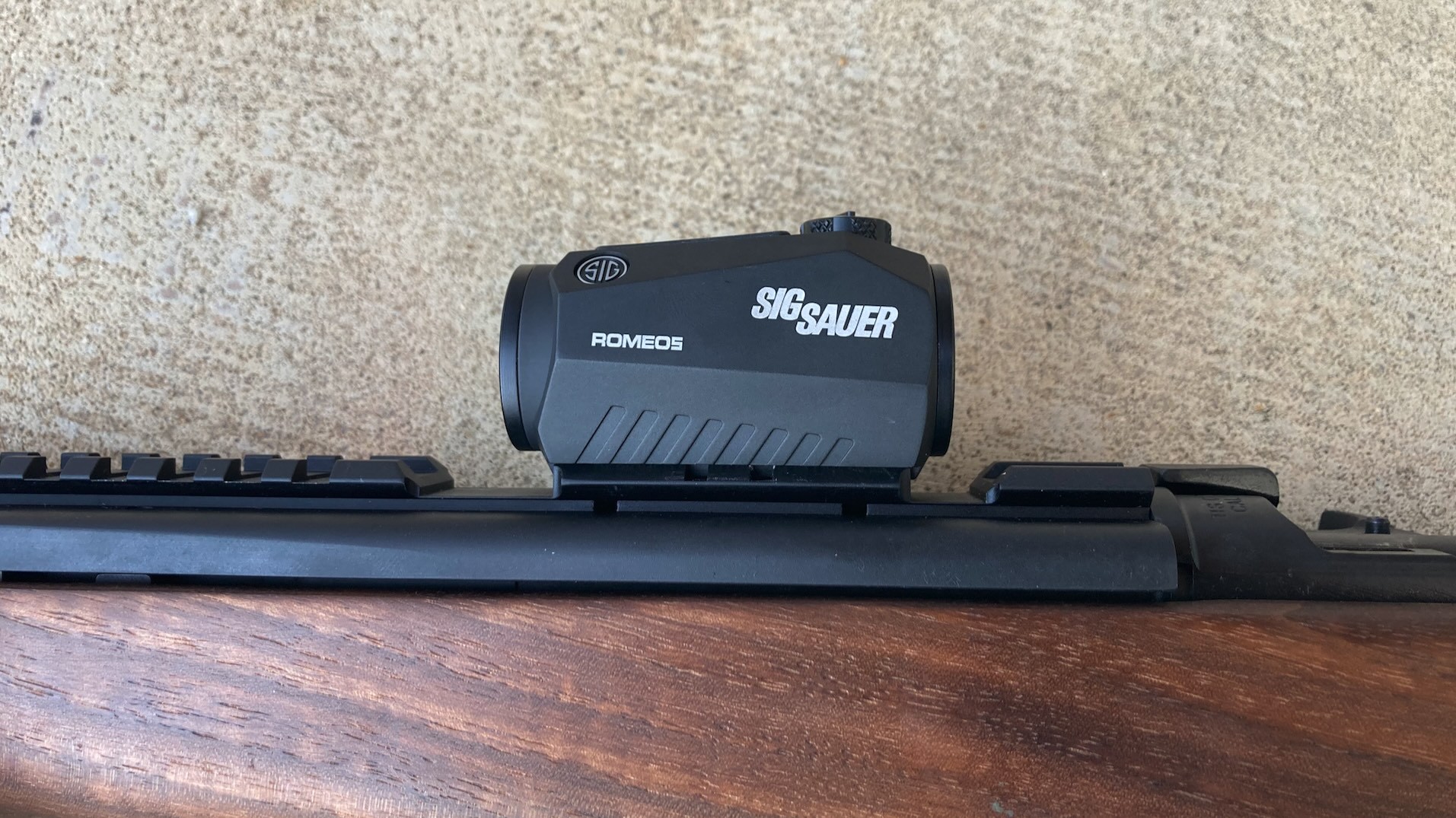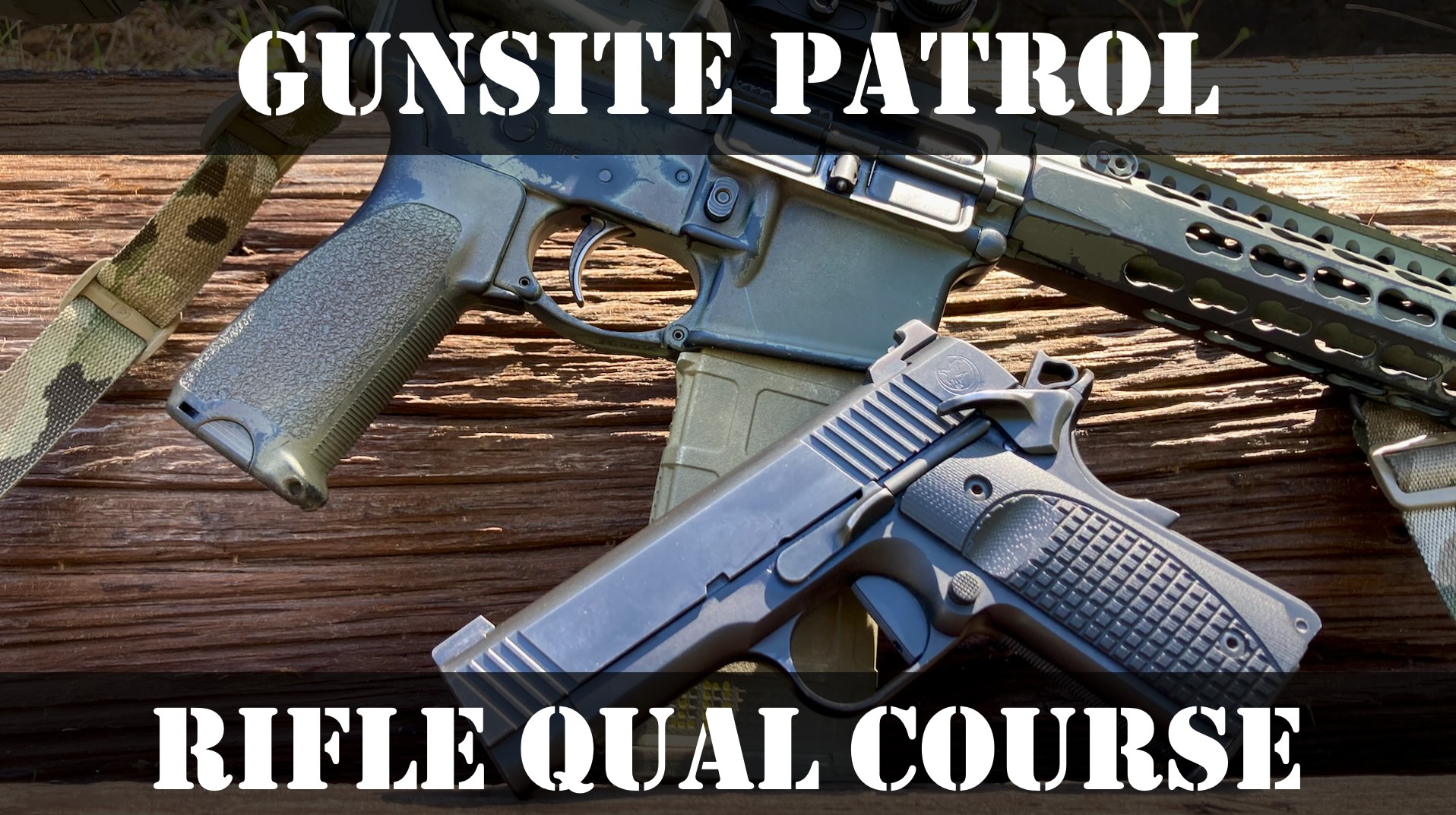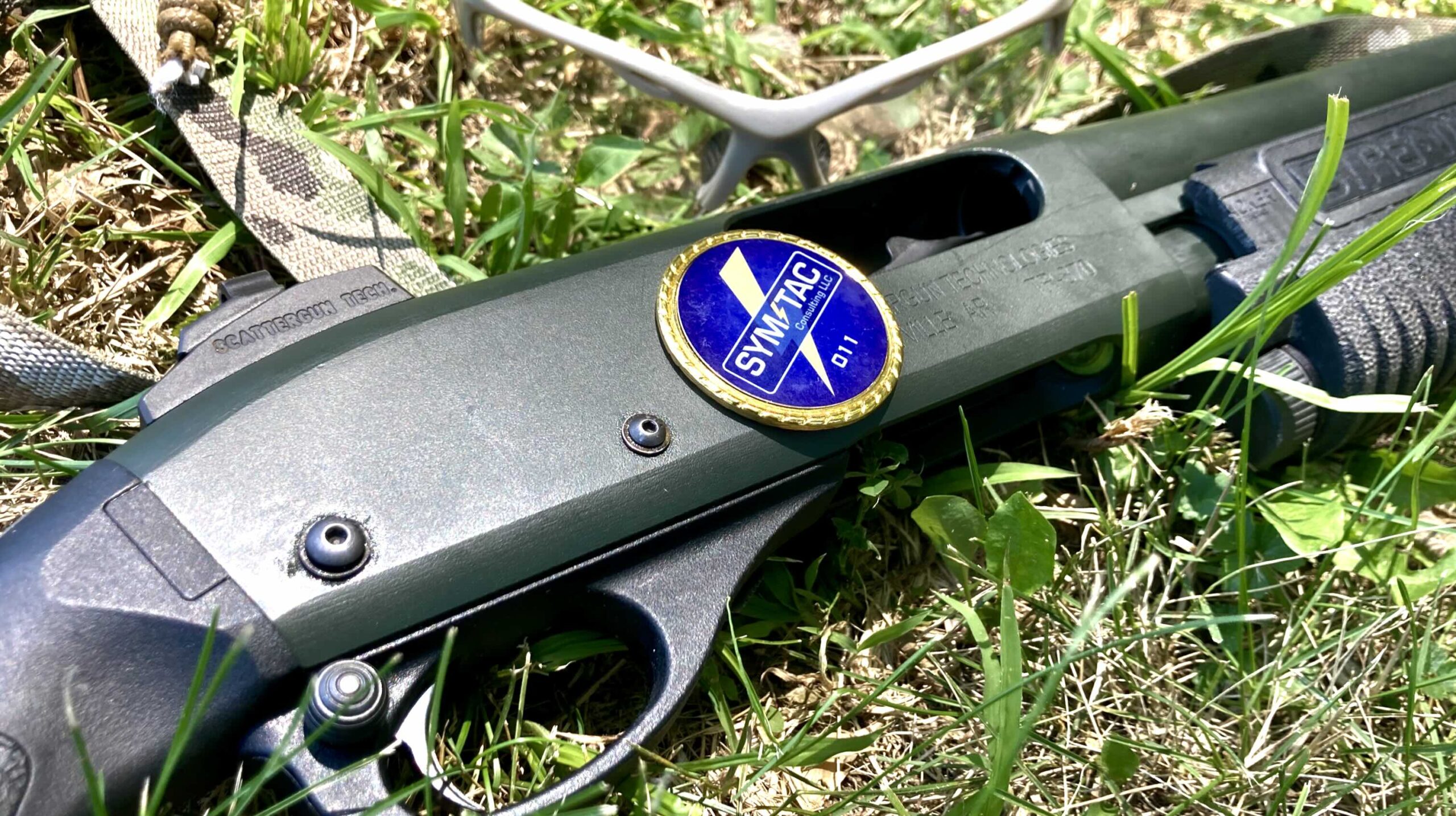In my last two posts on preparedness I have discussed preparing your body and preparing your mind. Today I am going to talk about yet another unpopular preparedness topic: financial preparedness. This is a very simple, two-step process: reduce expenses and increase reserves but don’t worry – I’ll go into a bit more detail.
Featured Image Attribution: Image retrieved from https://www.flickr.com/photos/pictures-of-money/17123250059, licensed under Creative Commons 2.0.
Disclaimer
At the risk of sounding like a broken record, I’m going to say this again: I am not perfect. I am not perfectly financially prepared. I am not exactly where I would like to be. In fact, I’m a long way from it. While I am no longer the financial dullard I was a year ago, I still have some growing to do. And once again, I write this article not as “do as I say” advice for you to follow. I write it to encourage myself as much as anything else.
My Preparedness Philosophy
Why am I spending so much time covering the “boring” aspects of preparedness? Why am I not jumping into guns MREs, lanterns and washboards and cross-cut saws? While I believe those things are important – and yes, I do believe that we all may well have the opportunity to live off of what we’ve prepared at some point in the future – we are much more likely to have other, much more mundane preparedness needs.
I subscribe to the “most likely first” school of preparedness thought. That is, you should prepare for the most likely emergencies first, before worrying about the less likely. That might seem like common sense until we realize that we are completely unprepared to deal with the loss of a single paycheck (highly likely) but are carrying two pounds of metal and Kydex around every day to deal with an armed attacker bent on our destruction (somewhat less likely).
I’m not saying we should prepare for only one problem at a time. We shouldn’t; preparedness is a holistic concept and we should probably be working on preparing ourselves in multiple ways constantly. In fact, I think we should stop focusing on single events so much and focus on becoming more resilient overall. Physical and mental preparedness being great examples of that model. From gunfight to COVID-19 infection to a hurricane, those “preps” help you regardless, and outside of a very few, very narrow circumstances, financial preparedness will help you, as well.
I’m not denying that sometimes circumstances or opportunity causes a “jump” ahead in one area that is disproportional to other areas of preparedness. Sometimes a great opportunity comes along and it’s a good idea to take advantage of it – even if it means having a year’s worth of water before you have a month’s worth of food (or whatever). Sometimes a threat comes along that warrants much more immediate focus on personal security preps. But most of the time most of us have the ability to choose what is most important to prepare for at that time.
So with that in mind I am going to cover one of the most valuable (get it?) preparedness topics possible: financial preparedness.
You Can’t Eat Gold…
A common pushback when encouraging someone to prepare financially is that, “you can’t eat gold.” People have said this directly to me and I understand the sentiment. The idea is that you should lay in things you can actually use because in a severe enough disaster money won’t be worth the paper it’s printed on. The problem with that logic is that it allows only two possible conditions: normal and full-on The End of the World As We Know It (TEOTWAWKI). I’ve talked about problems with “TEOTWAWK-modeling” before, and I’ll talk about them again (briefly) today.
An event so calamitous that money is rendered absolutely and permanently worthless is possible. Anything from hyperinflation to war to a supervolcano could render our currency completely valueless. It could render to an ounce of salt more worth than that of a pound of gold, or a loaf of bread more precious than a bread-box full of $100 bills. That could happen. Honestly, in the fullness of time it is likely that it will happen. But it’s really unlikely to happen in any of our lifetimes. Much more likely and much more common is the mundane, personal disaster.
I’m going to call this one like I see it: saying, “you can’t eat gold” is stupid. It’s intellectually lazy, and it’s a good way to pat yourself on the back for racking up credit card debt an canned, high-end AR with the latest LVPO and and taking on a $1,000+ monthly payment for your “bug out vehicle.” An analogy I’ve used for a long time to describe this is, yes, money could become worthless. But there are about fifty steps on the ladder between here and there, and money still means something on about 48 of those steps. Let’s talk about some reasons you should be financially prepared.
Why You Should Be Financially Prepared
While not nearly as dramatic, we should be prepared for the small-scale, personal disaster. What is a small-scale, personal disaster? The loss of a job is a very good example. Every few years when the government is shut down because Congress can’t pass a budget. Just days later the airwaves (well, the fiber-optic cables) are inundated with news stories about government workers who are on the brink of financial ruin… a week and a half before they have missed the first paycheck. If you can’t handle the loss of a single paycheck correcting that weakness should be an immediate and urgent preparedness priority.
Many things could come along that could force a loss of income. People get laid off. Positions in companies go away. Hell, companies go away. You could be sick or injured and exceed your vacation/sick leave. You could make some mundane procedural error the same week the company decides to “crack down” on TPS reports and get fired or demoted. Something, at some point, will come along in your life that will necessitate having some financial reserves.
Even if you don’t lose your job, loss of work is a very real thing right now because of long-term rioting in our cities and the ongoing pandemic. These things will pass…only to be replaced at some point with other disasters that slow human movement and negatively impact the economy. In the meantime, life still goes on. You still owe that car payment at the end of each month. You still need to come up with your mortgage, and you still need to be able to pay your utility bills and child support and credit card payments and whatever other obligations you may have.
We should also be financially prepared for the disasters we are all probably preparing for in other ways. Hurricanes, earthquakes, mud slides, wildfires, terrorist events… All of these are legitimate “disasters” and we should be prepared for them. But they won’t render money worthless. Having money can make surviving one of these disasters massively easier and less stressful.
Ways to be Financially Prepared
If I have successfully convinced you of the need to be financially prepared, you’re probably wondering, “how, exactly, does one go about being financially prepared?” The remainder of this article will discuss exactly that: how to bolster your financial preparedness. Again to caveat: I am not a financial planner. I’m just a normal dude. If you’re Joshua Sheats reading this you’re going to laugh at the simplicity of my suggestions. But they work. Given enough time they work.
Step One: Reduce Expenses
One of the most important things you can do to financially prepare yourself is to reduce expenses. If less money goes out each month, that is less money that you have to expend to maintain the same lifestyle. Unfortunately, I have experienced the loss of a great deal of work due to COVID (for some reason people are hesitant to congregate in a classroom for two weeks). This is kind of a drag for me – my income has been slashed over the past six months. Fortunately, our expenses aren’t very high at all. We don’t require huge inputs of cash each month to keep the lights on. By slashing expenses before we really needed to we – to borrow (and butcher) a term from John Mosby – “collapsed early and avoided the rush.”
How do you reduce expenses? Any number of ways, and what I am about to recommend is by no means comprehensive, but let’s get into some specifics. Hopefully these ideas will give you more ideas.
Consume less.
In my last preparedness article, Preparing Your Mind, I discussed getting comfortable being a little bit uncomfortable. One of the techniques I recommended was reducing your reliance on heating and air conditioning and getting comfortable being a tiny bit outside your perfect comfort zone. To some Americans that seems like sacrilege, but with our non-reliance on electric heat or cooling (and our preference for reading over watching TV) our power bill is extremely low. I’m not saying don’t use air conditioning at all, but maybe consider keeping your house at 78 instead of 68. Maybe consider piling blankets on the bed, or investing in an actual four-poster bed with curtains instead of paying to heat your entire house all night long. This is yet another example of multiplicative effects – a single change that impacts multiple areas of your life for the better.
Prevent Recurring Charges
This is a micro example but a good one. Those forgotten, recurring charges can really add up. Most Americans probably have a few of these. First things first: I’d clean house and get rid of as many of these as possible. Once I had done that, I would make sure they never happen again. I have written about a service called Pay With Privacy before (aka Privacy.com). Pay With Privacy allows you to create virtual credit cars that can be used online. In addition to reclaiming a little bit of privacy over your purchases, you also get to make sure that you aren’t charged beyond what you wish to be charged.
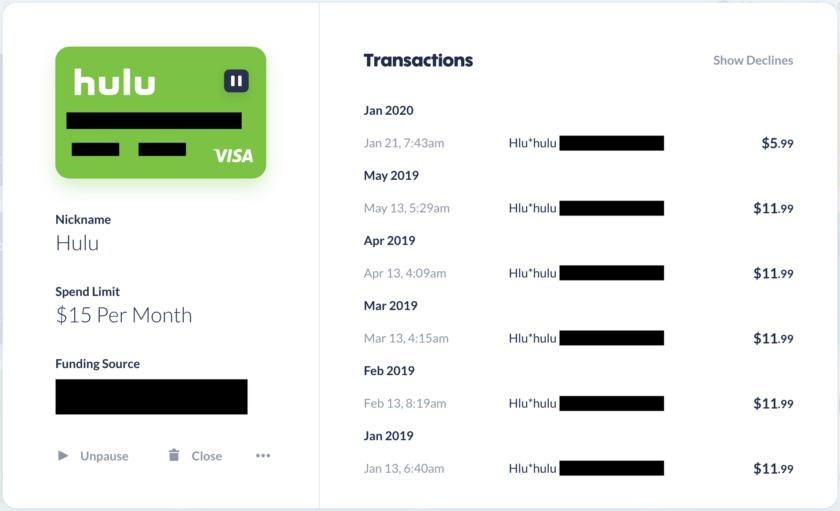
Take a look at the card above, for a Hulu subscription. We had a Hulu subscription for a while and decided to discontinue it from May 2019 to January of 2020. Just to be sure that I wasn’t charged beyond the timeframe I chose, I paused the card. When the card is paused no charges from it will be approved, so if I’ve forgotten my login or they make cancelling difficult it doesn’t matter – they can’t take money from my account. Secondly, I have set a maximum monthly amount of $15. If Hulu attempts to bill this card for more than $15 in a one-month period the charge will be declined. I can (and should) reduce that amount to $6, inline with my actual monthly charge.
Reduce Debt
Another way to reduce expenses is to reduce debt. Revolving debt is, at best, a monthly expenditure. Reducing your debt reduces your outgoing expenditures and your liability.
Pay things off.
If you pay off your vehicles, credit cards, and other recurring payments, those payments go away. You still have the car, but suddenly you don’t have to pay $600 for it each month. Paying things off takes time and you probably can’t just decide to pay your car off tomorrow. But you can start chipping away at it. Even a few extra dollars against the principle each month goes a long, long way.
Consider Some Downgrades
This is a tough one for many Americans, but you might consider downgrading. As I mentioned in my homestead planning article, we bought way, way inside our budget. We borrowed much, much less than the amount for which we were preapproved, and our preapproval was only based on only the lowest of our two incomes. Now, for us this was still an upgrade, but our house is very modest by Western standards. If you have a house with four empty bedrooms, you’re paying not only for that space, but also the tax value on that space, money to heat and cool that space, and the cost of insurance for a larger, more valuable home. A “downgrade” might hurt the ego a bit, but it will almost certainly lower your expenses in multiple ways.
The same goes for vehicles. This is another area in which Americans struggle. Thanks to decades of successful advertising our vehicles have been emotionally tied to our own self-concept. But if you can disentangle this object from your identity, you can make major financial progress, quickly. This is an area where I have made some wise decisions. I used to be like the average American: a healthy car payment, the attendant insurance, and the desire for a “new” car shortly after mine was paid off. When I got serious about getting my financial house in order I made a more radical change.
I sold the car I was driving. I had “purchased” it new (by borrowing money, of course), it was a year old, and I had four years of payments ahead of me. I used the money from that sale to buy a truck outright for $7,000. I drove that truck for a year and a half, until I needed something smaller and more fuel efficient. I sold it for $9,000 – the end result being I drove it for 18 months for only the cost of fuel and maintenance, and made $2,000 on it. I paid cash for each of the next three of my vehicles. None were new, none were prestige vehicles, but all were dependable and perfectly serviceable. All except one (a Honda for which I paid only $1,000) outlasted my need and sold for more than I paid. All except the current car cost under $10,000 (I paid a bit more for this one because intend to drive it for at least ten years) and the best part – I actually own them.
Step Two: Build Reserves
After cutting your expenses the next best way to be financially prepared is build reserves. This takes several forms. First and foremost, I am a huge proponent of cash. I like cash because of the privacy it affords. I like cash because it is instantaneous, requires no phone or internet connection, and won’t get wiped out if you lay a magnet on your wallet. In some ways cash is still king – it can’t buy happiness, but it can buy everything else.
Cash on Hand
I recommend having access to about $1,000 on your person. If you can’t make this happen immediately, at least make it a goal. There aren’t many problems that $1,000 won’t solve. It will get you on an airplane and get you out of a bad area. It will get you lodging and food for at least a few days. A thousand dollars can make major repairs on your vehicle or pay for at least some healthcare.
And if you have a “normal,” non-preparedness problem guess what? That $1,000 isn’t tied up in a new rifle or buckets of rice and beans. It’s right there, in liquid form, in your wallet. Are you about to fall behind on your mortgage? Pull out that $1,000, go buy a money order, and mail it to the bank. Do you need to pay your bills because you’re out of work? Run around to the various utilities and pay them in cash. Cash also lets you take advantage of opportunities, and usually at better terms than credit. Did you just run across a used ___ for a great price? You have $1,000 in your wallet, so…
Some of you will tell me that carrying cash is a bad idea. I freely admit that cash can be stolen, lost, or damaged/destroyed. On the other hand, I’ve carried cash all my life. That doesn’t mean it can’t happen, but I believe if you’re a responsible person that can keep up with your things you can probably keep up with your wallet. Also, logistically, I don’t keep $1,000 in my wallet. I try to keep a couple hundred bucks in my wallet at any give time, and $1,000 in my APEC bag.
Cash at Home
I also like to have some cash at home. Cash at home has some advantages and disadvantages, as well. It isn’t immediately accessible, which is a good thing in some ways – you can’t be robbed of it on the street. Unfortunately, it also isn’t instantly available to you when it might be a benefit. Cash at home is much more secure than cash on your person, allowing you store larger amounts. I recommend a goal of $10,000 in cash for most people.
There aren’t many problems in life that cannot be solved with $10,000. That amount of money will secure housing for months. It will not only repair your car, but buy you another car should you need it. It will pay for major repairs to your home. If your expenses are very low, $10,000 can go a very, very long way. I realize that $10,000 may seem like an unattainable sum of money to some of you. It did to me at one point, too. Until I realized that in just a four or five year period I was spending tens of thousands on a car, and simply by “downgrading” I could funnel much more of that money to my own savings.
Cash in the Bank
Yes, I also believe you should have some cash reserves in the bank. Personally, I don’t think Joshua Sheats’ recommendation of $100,000 in the bank is a bad one. Money in the bank can be spent differently than cash money. It can be used for much larger purchases, and it is much safer than cash stored at home.
Precious Metals
Finally, I do think you should have some precious metals. I used to make fun of people that hoarded gold, but it makes sense as a way of protecting wealth. Precious metals are far more durable over time than currency. What exactly do I mean by that? Well, you won’t make a whole lot of money investing in gold. However, what you put in is what you’ll get out. For example, $20 doesn’t go as far today as it did in 1920 or 1970. But an ounce of gold will go at least as far. An ounce of gold goes as far as it did in 1820 or 1720 or 1020… or maybe even a bit further depending on the financial winds. Precious metals do a very good job of holding their value relative to fiat currency.
Gold also allows you to store wealth in a very compact form. An ounce of gold is only slightly larger (and a good bit heavier) than a quarter, but is worth (at time of this writing) just over $1,800. Compactness makes gold easy to travel with. Silver isn’t nearly as compact, but is far more easily divisible. Silver can be broken down into very small denominations relative to gold (which is normally sold only down to the quarter of an ounce.
Closing Thoughts
This isn’t really intended to be financial advice. I am not the financial expert and would never purport to be. I do think I am qualified to speak to the importance of preparing financially, though. Had my girlfriend and I not had strong financial preparations consisting of both cutting expenses and building reserves, the past few months would have been much more stressful and difficult for us. What I do hope this has accomplished is impressing the importance of preparing financially. I get it – you can’t eat gold and when you need a gun, all the money in the world isn’t going to make up for it. But neither is a gun going to compensate for loss of income, so you shouldn’t overlook either.
